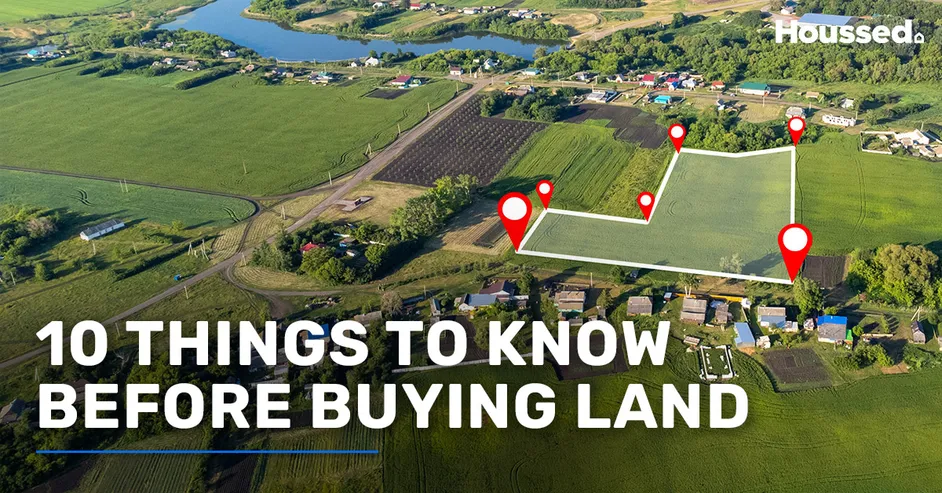10 Things To Know Before Buying Land

Thinking about buying land but not sure where to begin? Purchasing land is a big decision that involves more than just finding the ideal plot. From understanding zoning laws to verifying ownership, there are several factors to consider before signing anything. Overlooking even one detail could lead to expensive mistakes or legal issues.
This comprehensive guide includes the 10 things to know before buying land to help you make a confident and informed purchase. Let’s break it down to ensure your investment is safe and rewarding.
10 Essential Things to Know Before Buying Land
1: Understanding the Zoning Laws
In a list of 10 things to know before buying land, understanding zoning laws is pivotal. Zoning laws determine how land can be used—residential, commercial, agricultural, or mixed-use—and vary by location. You must consult local authorities to confirm if their intended use aligns with zoning regulations.
For agricultural land, state-specific rules may restrict non-agriculturists or outsiders from purchasing. Residential plots often require land-use conversion, while commercial plots demand verification of zoning, Floor Space Index (FSI), and potential height restrictions. Failing to follow zoning laws can lead to legal issues or halted development. So, doing thorough research is essential before purchasing land.
2: Confirm the Ownership and Title
Before purchasing land in India, it's essential to verify the ownership and property title deeds. The title deed confirms whether the seller or builder has full legal rights to the property.
Unclear titles or fraudulent ownership claims can lead to serious problems, so it’s crucial to ensure the land is free from disputes or encumbrances. To be thorough, consider hiring a lawyer to help you verify the deed. Taking this step will safeguard you from potential legal problems and ensure that your investment is secure.
3: Verify the Boundaries of the Property
One of the important things to check before buying a plot is verifying the property boundaries to avoid potential disputes. Hiring a professional surveyor to measure the land and compare it with official land records is advisable.
Ensure the boundary markers are clearly defined and intact. In India, boundary issues, particularly in rural areas, can lead to conflicts, so taking the time to check boundaries is crucial. Accurate boundary verification not only protects your investment but also ensures you get what you're paying for. If the boundaries are unclear, it's wise to consult a legal or survey expert for guidance.
4: Obtain a Certificate of Encumbrance and Assess the Market Value
The Encumbrance Certificate (EC) is an important document that indicates whether the land is free from legal or monetary issues, such as unpaid loans or mortgages. It also records past property transactions.
If the land is free from liabilities, Form 15 is issued; if there are any encumbrances, Form 16 is provided. This certificate is essential for property transactions, ensuring the land is clear of legal or financial problems.
5: Analyse the Terrain and Soil Quality
In the list of 10 things to know before buying land, terrain and soil quality play crucial roles in determining the land's suitability for your intended use. Rocky or marshy terrain can drive up construction costs, while fertile soil is essential for agricultural purposes.
Soil testing is important to assess its bearing capacity, fertility, and drainage properties. A thorough analysis of the terrain ensures the land meets your needs and helps avoid unforeseen expenses in future projects. Consulting experts like geologists or soil analysts can provide valuable insights into the land's potential.
6: Examine the Facilities and Infrastructure
The accessibility of essential facilities like water, electricity, and road connectivity can make a huge difference in your land purchase. It's important to assess the property's proximity to key amenities such as schools, hospitals, markets, and public transport.
Land in remote areas may lack these basic services, which could require a significant investment to establish them. Furthermore, ensure that utilities are accessible and how easily they can be connected to the property, as this will impact both the cost and convenience of developing the land.
7: Examine Plans for Future Development
In the list of 10 things to know before buying land, it's important to research any upcoming developments in the areas. Future projects like highways, schools, or shopping centres can significantly increase the land's value, which is why many real estate investments are made in growing areas with potential.
Before buying a house or buying land, look into the development plans for the area you're interested in, such as new roads, business hubs, or educational centres, as these could enhance the property's value. However, ensure these developments align with your vision for the land, as some projects might not fit your plans or could affect the land's appeal.
8: Verify the Status of Land Conversion
In India, agricultural land must be converted for non-agricultural purposes, such as housing or commercial use. The conversion process requires approval from local authorities, such as the tehsildar or district officials. It’s essential to verify that the land has been legally converted and obtain the official conversion certificate.
Without the proper conversion status, any construction or development on the land could be deemed illegal. To avoid penalties or demolition notices in the future, make sure all documentation is in order before proceeding with the purchase.
9: Confirm Environmental Clearances
Environmental clearance is mandatory if the land is located in an ecologically sensitive area or if you're planning a large-scale project. In India, you may need approvals from the State Environmental Impact Assessment Authority (SEIAA) or the Ministry of Environment, depending on the nature of the project.
It's crucial to verify that the land is not within forested or protected zones. Failing to obtain the necessary environmental clearances can lead to legal issues and project delays, so ensure compliance before proceeding with your purchase.
10: Adopt a Strategic and Considerate Approach
When buying land, take a careful, well-planned approach. Research the location, potential risks, and legal requirements thoroughly. Consult real estate experts, lawyers, and locals for valuable insights. Avoid decisions based solely on emotions or a seemingly low price.
So, when it comes to 10 things to know before buying land, a thoughtful, informed approach will help you find land that meets your needs while steering clear of hidden issues or unexpected challenges.
FAQ's
Before buying land, check the title deed, zoning laws, boundaries, Encumbrance Certificate, and environmental clearances. Also, evaluate the facilities, infrastructure, and future development plans to make sure the land meets your needs and legal requirements.
To verify land ownership, examine the title deed and Encumbrance Certificate. Cross-check these with records at the Sub-Registrar’s office. You may also consult a legal expert to confirm the seller’s legitimate ownership of the property.
A title deed is a legal document that confirms ownership of a property. It outlines the owner's rights and any legal restrictions on the land.
Legal formalities include verifying the title deed, Encumbrance Certificate, and boundaries. If necessary, obtain approvals for land conversion and environmental clearance. The sale agreement must be registered with the local Sub-Registrar’s office, and stamp duty should be paid according to state laws.
Land registration involves preparing the sale deed, paying stamp duty, and registering the deed at the Sub-Registrar’s office. Both buyer and seller must be present with the required documents, including ID proof, address proof, and property records.









